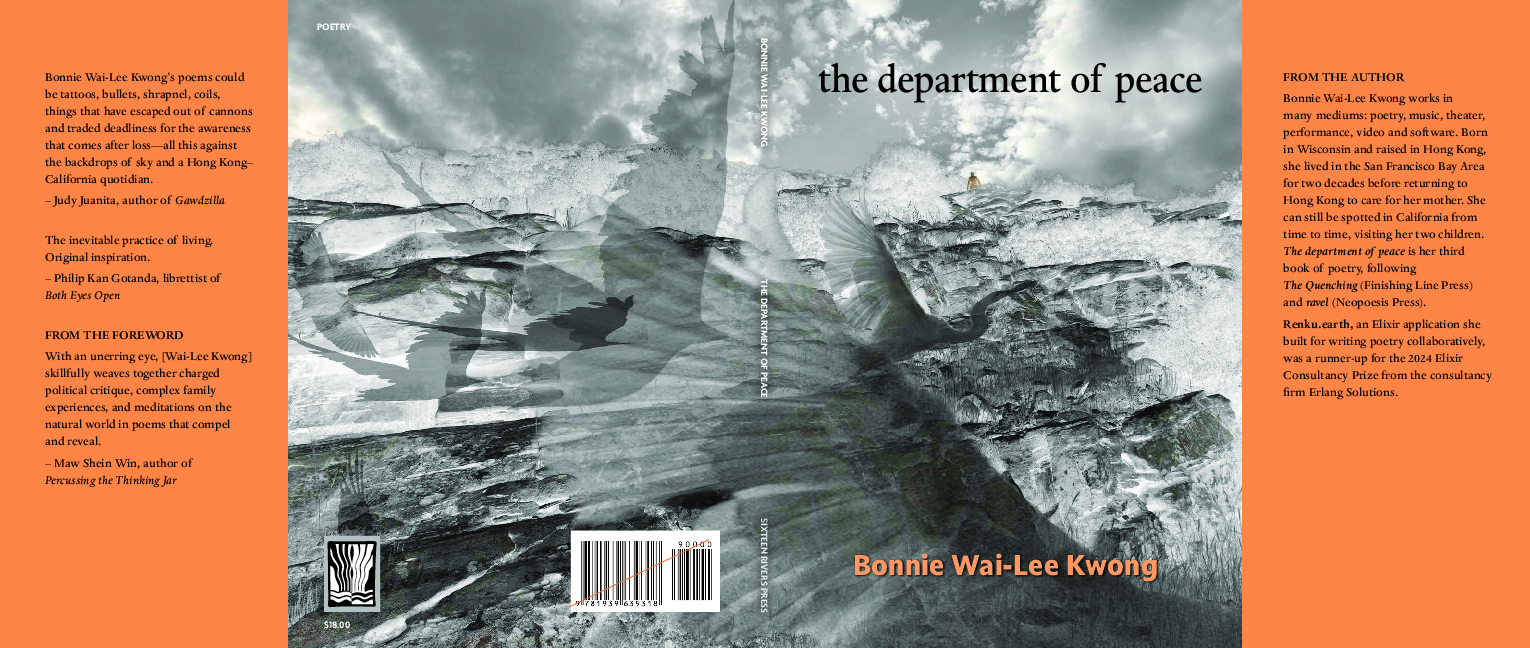We can't find the internet
Attempting to reconnect
Something went wrong!
Hang in there while we get back on track
the department of peace

The first reading for my third book of poetry the department of peace was an AWP (Association of Writers & Writing Programs) conference off-site event at Catcher in the Rye, a literary themed-bar in L.A. Publishing my book with the collective Sixteen Rivers gave me the chance to prioritize quality. I was able to add poems to it quite late in the publication timeline. I wanted to speak to the times. I received quite a few heartfelt comments and was especially moved when I was saw tears in one of my fellow Sixteen Rivers poet’s eyes.
Moira Magneson’s powerful poem about a journalist’s family life cut through many layers in me and left a deep impression, particularly since I had spent hours talking to her as she drove us from San Francisco to L.A. Terry Ehret and Nancy Morales’ translation of Ulalume González de León’s poetry left me in a luxurious, contemplative, Spanish-speaking space. Nancy graciously spoke to me for a bit in Spanish. The audio at the bar was too poor for me to understand Patrick Cahill’s reading that night.
My friend Judy Juanita invited me to a book signing session at her table. I was delighted to meet Paula, the other grandma of Judy’s grandchild Jamal, who said her eyes wanted to move all over the page, just like the way I’d arranged my poetry. She pushed me to sell my books: Keep the jokes coming! Uh…lemme take a class in standup first. I sold a couple of books at Judy’s table, none at the Sixteen Rivers table. I got another copy of Judy’s Virgin Soul so I could read it without taking my other copy out of storage.
Our reading at Book Passage in Corte Madera coincided with the 50501 “Day of Action.” I wished I had been able to participate in the protests. I was finally able to hear Patrick Cahill’s poetry, and learned about Muslim and Jewish coexistence in Isfahan. The organizer at Book Passage gave each reader a note pad with our name custom printed on each page. I told her this would inspire me to write more. The event left me curious about the founding of the book store and its mission to bring forth emerging voices. I had read there more than a decade ago for the poetry journal Runes, so I know their poetry curation efforts to be longstanding.
I am grateful to Nancy for elucidating the relationship between “familiar” and “family” in Spanish, in addition to the English definition we are familiar with. It’s one of those relationships that’s apparent on the surface, though I wasn’t sure how deep I should take it. She is a natural teacher and a masterful translator whose original work I hope to have the opportunity to experience soon. She told me about an AWP session where there was some discussion about screenwriting being a lucrative business. I look forward to seeing more from her in whatever form(s) she chooses.
At the reception after the Book Passage reading, I brought up the possibility of opening up Sixteen Rivers to other genres besides poetry. There was support in the collective for performance–why not prose? One fellow press member had questions about how to evaluate poetry and prose manuscripts side by side. Another member posed questions along the lines of: What would change? What would we lose? To be continued, I suppose. We are scheduled to evaluate poetry manuscripts for 2027 next month.
The Poetry Flash reading series was central to the genesis of certain poems in the book. At the Poetry Flash reading for my first book ravel, I met Penny Edwards, who created the Artographies project for me and Maw Shein Win to write together, drawing inspiration from stories of migration stories, some of which I included in the department of peace. It was good to come full circle in Berkeley again, with Poetry Flash and Sixteen Rivers in Art House Gallery, full of psychedelic swaths. There were many friends and collaborators, Sean Yarborough, composer and multi-instrumenta list, whose musical piece “Plastic Business” inspired “you’re just waking up.” The youngestmember of the audience was a toddler, my friend and former collaborator composer and guitarist Oliver Mok’s son.
At my book launch in Hong Kong as part of the Peel Street poetry series, I was surprised when audience members I didn’t know started buying books before the reading began. An audience member asked about the title of the book, again, before I even approached the mic. I started the reading by explaining “the department of peace” was a real thing, a proposal Dennis Kucinich created and Barbara Lee took on. Poets Tegan Smyth, Akin Jeje and Jason Lee each read a couple of poems from the book, in the tradition of the Peel Street series. Seeing which poems they singled out in the book reinforced the urgency of my feelings on current events I had written about: the Atlanta spa shootings, genocide in Gaza, the threat of nuclear war and the war in Ukraine. I also asked them to read a poem of their own in dialogue. When they brought their own poetry to the mic, the resonances were in the themes of migration, the power dynamics of poverty and sex work, and centering the stories of sidelined women. I was grateful for the small but comopolitan audience, reminiscent of my own globetrotting, leaving me with the feeling I could travel even further without physically moving by talking to them. By the end of the event, I sold all the books I’d made available.